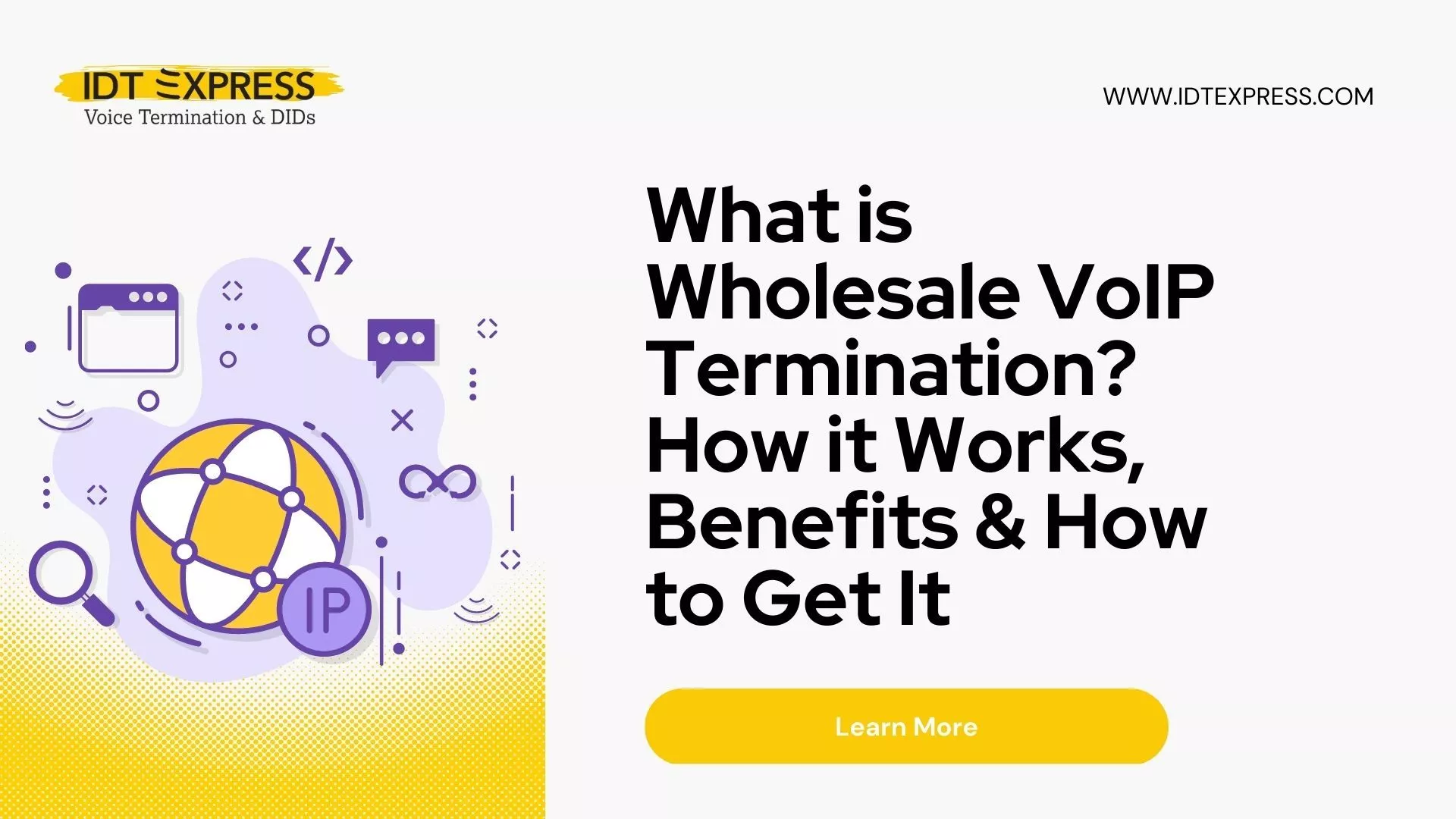VoIP, or Voice over Internet Protocol, refers to the use of the internet to transmit voice calls, as opposed to the traditional telephone network. Wholesale VoIP termination refers to the process of routing and delivering VoIP calls to their final destination.
Wholesale VoIP termination providers act as intermediaries between businesses and telecom carriers, offering the infrastructure and technical expertise necessary for large-scale VoIP call delivery. These providers purchase large quantities of voice traffic from carriers and resell it to their customers at a lower cost.
How Wholesale VoIP Termination Works?
Wholesale VoIP termination providers use advanced routing technologies to deliver calls to their intended recipients. These providers connect to multiple carriers and operate large call termination servers that process incoming calls and route them to the right destinations.
When a customer makes a VoIP call, the call is first transmitted to the wholesale VoIP termination provider. The provider then analyzes the destination number and determines the most efficient route for the call. The call is then transmitted to the next carrier and, finally, to the intended recipient.
Benefits of Choosing a Wholesale VoIP Termination Provider
Choosing a wholesale VoIP termination provider offers many benefits to businesses. Some of the key benefits include:
- Cost Savings: Wholesale VoIP termination providers offer substantial cost savings compared to traditional telecom carriers. This is because they buy large quantities of voice traffic at wholesale prices and pass on these savings to their customers.
- Improved Quality of Service: Wholesale VoIP termination providers use advanced routing technologies to deliver calls with high quality and reliability. This leads to improved call quality, reducing the number of dropped or garbled calls.
- Increased Flexibility: Wholesale VoIP termination providers offer flexible solutions that can be tailored to meet the specific needs of businesses. They can offer custom routing solutions, call volume discounts, and other flexible pricing options.
- Advanced Features: Wholesale VoIP termination providers often offer advanced features, such as call routing and IVR, that are not available from traditional carriers. These features can help businesses streamline their communication processes and improve customer experience.
- Scalability: Wholesale VoIP termination providers can scale their services to meet the growing needs of businesses, making it easier for businesses to expand their operations without worrying about the limitations of their communication infrastructure.
Evaluating Wholesale VoIP Termination Providers for Quality and Reliability
When evaluating wholesale VoIP termination providers, it is important to consider the following factors:
- Network Quality: The quality of the provider’s network is one of the most important factors to consider. Look for providers that use high-quality routing technology and have a track record of delivering reliable and high-quality VoIP calls.
- Pricing: Wholesale VoIP termination providers offer different pricing models, so it is important to compare prices and choose a provider that offers the best value for money. Look for providers that offer flexible pricing options, such as custom routing and volume discounts.
- Customer Support: Good customer support is critical for ensuring that businesses can resolve any issues or problems quickly. Look for providers that offer 24/7 support and have a reputation for providing excellent customer service.
- Features: Wholesale VoIP termination providers offer different features, such as call routing and IVR, so it is important to choose a provider that offers the features that are important to your business.
- Security: The security of your communication infrastructure is critical, so look for providers that offer secure and encrypted connections and have
Comparing the Top Wholesale VoIP Termination Providers for Small and Medium-Sized Businesses
When choosing a wholesale VoIP termination provider, it is important to compare the offerings of different providers to find the best fit for your business. Here are some factors to consider when comparing providers:
- Network Coverage: The provider’s network coverage is a critical factor to consider, as it determines the quality of service and the countries you can call. Look for providers that offer extensive network coverage and have good connectivity to countries that are important to your business.
- Price: Price is always a major consideration when choosing a wholesale VoIP termination provider. Look for providers that offer competitive prices, as well as flexible pricing models that can be tailored to your business needs.
- Customer Service: Good customer service is important when choosing a wholesale VoIP termination provider. Look for providers that offer 24/7 support and have a reputation for providing excellent customer service.
- Technology: The technology used by the provider is also a critical factor to consider. Look for providers that use advanced routing technology and have a proven track record of delivering high-quality VoIP calls.
- Contract Terms: The contract terms of a wholesale VoIP termination provider are also important to consider, especially for small and medium-sized businesses. Look for providers that offer flexible contract terms and do not lock you into long-term contracts.
The Future of Wholesale VoIP Termination: Trends and Predictions for the Industry
The wholesale VoIP termination industry is growing rapidly, with many new players entering the market and offering innovative solutions. Here are some trends and predictions for the future of wholesale VoIP termination:
- Increased Adoption of VoIP: As more businesses adopt VoIP for their communication needs, the demand for wholesale VoIP termination services is expected to continue to grow.
- Growth of Cloud-Based Solutions: The trend towards cloud-based solutions is expected to continue, with more wholesale VoIP termination providers offering cloud-based solutions for businesses.
- Increased Competition: With the growing demand for wholesale VoIP termination services, competition in the industry is expected to increase, leading to lower prices and better quality of service.
- Advancements in Routing Technology: The use of advanced routing technology is expected to continue, leading to improved call quality and reduced latency.
- Expansion into Emerging Markets: As more businesses expand into emerging markets, wholesale VoIP termination providers are expected to expand their network coverage to meet the growing demand.
Wholesale VoIP termination provides a cost-effective and flexible solution for businesses looking to transmit voice calls over the internet. By choosing a wholesale VoIP termination provider, businesses can benefit from cost savings, improved quality of service, and advanced features that are not available from traditional carriers.
When choosing a wholesale VoIP termination provider, it is important to consider factors such as network quality, pricing, customer support, features, and security. With the growing demand for wholesale VoIP termination services and the increasing competition in the industry, businesses can expect to see continued advancements in technology and lower prices in the future.
How can you secure wholesale VoIP termination that meets the specific needs of my routes, campaign type, and desired quality?
To get wholesale VoIP termination tailored to your routes, campaign type, and quality requirements, follow these steps:
1. Understand Your Requirements
- Traffic Volume: Determine the call volume you’ll handle (low, medium, or high). This helps providers offer competitive pricing.
- Destination Routes: Specify the regions or countries you need termination for. Focus on prioritizing high-traffic routes.
- Campaign Type: Whether it’s promotional, transactional, or conversational traffic, the nature of the campaign impacts the kind of termination quality you need.
- Call Quality Requirements: Define your acceptable ASR (Answer-Seizure Ratio), ACD (Average Call Duration), and PDD (Post-Dial Delay) metrics.
2. Research Reliable Providers
- Look for VoIP providers with proven expertise in wholesale termination, such as IDT Express, VoIP Innovations, or others with strong reputations in the industry.
- Check if the provider offers direct routes (for higher quality) or gray routes (for cost savings).
- Verify their interconnects with Tier-1 or Tier-2 carriers.
3. Evaluate Pricing Models
- Compare pay-per-minute rates for your priority destinations.
- Look for volume discounts or wholesale packages that align with your traffic scale.
4. Test Route Quality
- Request trial accounts or test calls to assess route quality.
- Monitor metrics like jitter, latency, call drops, and voice clarity during tests.
5. Check for Scalability
- Ensure the provider can scale with your campaign needs—especially if you’re running high-volume seasonal campaigns.
6. Negotiate SLAs
- Establish a Service Level Agreement (SLA) to guarantee uptime, call quality, and support response times.
- Ensure the SLA covers both quality metrics and redundancy in case of outages.
7. Leverage SIP Trunking
- Use SIP trunks to connect your system to the provider’s network for efficient call routing.
8. Request 24/7 Support
- Ensure the provider offers around-the-clock support, especially if you’re operating across multiple time zones.
9. Monitor Performance
- Use real-time analytics or monitoring tools provided by the VoIP provider to keep track of route quality and optimize your campaigns.
IDT Express, as a wholesale VoIP termination provider, offers a reliable and cost-effective solution for businesses looking to transmit voice calls over the internet. The company’s extensive network coverage, competitive pricing, and commitment to customer service make it an ideal choice for businesses of all sizes. With its advanced routing technology, flexible contract terms, and commitment to security, IDT Express is well-positioned to meet the evolving needs of businesses in the ever-changing world of wholesale VoIP termination. The future of the industry looks bright, and businesses can expect to see continued advancements in technology and lower prices as the demand for wholesale VoIP termination services continues to grow. With IDT Express as your wholesale VoIP termination provider, you can be confident that you are making the right choice for your business.
FAQ: Wholesale VoIP Termination
1. What is wholesale VoIP termination?
Wholesale VoIP termination refers to the process of routing voice calls over the internet from one provider (typically a carrier or wholesaler) to another provider or end-user. It is generally purchased in bulk at discounted rates and is used by businesses to manage high volumes of international or long-distance calls.
2. How do I determine which wholesale VoIP provider is right for my business?
To select the best provider, consider the following factors:
- Traffic Volume: Choose a provider who can handle your call volume efficiently.
- Destination Coverage: Ensure the provider offers coverage in the countries or regions you need.
- Call Quality: Assess the provider’s reputation for call quality, focusing on metrics like latency, jitter, and call drop rates.
- Pricing Structure: Compare per-minute rates and ask about volume discounts.
- Support Services: Ensure the provider offers 24/7 customer support for troubleshooting and optimization.
3. What is the difference between Tier-1 and Tier-2 VoIP providers?
- Tier-1 Providers: These are the major global carriers with direct interconnections to the public switched telephone network (PSTN). They offer the highest quality and reliability but at higher prices.
- Tier-2 Providers: These providers typically purchase wholesale VoIP services from Tier-1 carriers and resell them at a lower cost, often with varying levels of call quality.
4. How do I evaluate call quality in wholesale VoIP services?
Call quality can be evaluated based on key metrics like:
- ASR (Answer-Seizure Ratio): The percentage of successful call attempts that are answered.
- ACD (Average Call Duration): The average length of a completed call.
- PDD (Post-Dial Delay): The time delay between dialing and the start of the call.
- Jitter and Latency: These factors affect the clarity and reliability of voice communication.
5. Can I get custom VoIP termination based on my campaign needs?
Yes, most wholesale providers can customize termination services based on the type of campaign you’re running. Whether your campaign is promotional, transactional, or conversational, ensure you specify your requirements for call quality, routing, and volume.
6. What are the pricing models for wholesale VoIP termination?
Pricing for wholesale VoIP services is typically structured around:
- Pay-per-minute: You are charged based on the actual minutes used.
- Monthly fee: A flat fee that covers a specified number of minutes.
- Volume discounts: Many providers offer reduced rates based on the volume of calls or traffic.
7. How can I test the quality of a VoIP provider before committing?
Most providers offer a trial period or allow for test calls. During this trial, assess metrics like call clarity, connection stability, and overall quality. Some providers also provide real-time monitoring tools to help you track call performance.
8. What is the importance of an SLA (Service Level Agreement)?
An SLA ensures that the provider meets agreed-upon performance standards, such as uptime, call quality, and response times for support. It’s crucial for mitigating risks and ensuring that the VoIP termination service meets your expectations.
9. How can I scale my VoIP termination service as my business grows?
Choose a VoIP provider with flexible, scalable solutions that can grow with your business. Look for providers that can handle increased traffic volumes, provide additional routes, and allow for quick adjustments in pricing and services.
10. What types of customer support should I expect from a wholesale VoIP provider?
A reliable provider should offer 24/7 technical support via phone, email, and live chat. Ensure they have a dedicated team to troubleshoot issues, optimize routes, and assist with service adjustments as your business needs change.




